Right after graduating at the National Institute of Dramatic Art (NIDA), Cate Blanchett did plays with the Sydney Theatre Company and Griffin Theatre Company that launched her career in theatre. She has won two awards from Sydney Theatre Awards for plays she did with the two theatre companies.
Top Girls (1992)
Cate Blanchett as: (Understudy) Patient Griselda/Nell/Jeanine
Directed by: Melissa Bruce
Translation by: Caryl Churchill
Play run: April 1993
Venue: The Wharf at Sydney Theatre Company
Top Girls introduces us to the high-flying Marlene, a woman caught in a quandary over the demands of a flourishing career and the familial responsibilities of her past. It asks questions of equality, feminism, privilege, capitalism, and motherhood that resonate today as much as they did in the early Thatcher era in which the play was conceived.
Cast
Cate Blanchett
Kris Bidenko
Linda Cropper
Deborah Kennedy
Elizabeth Maywald
Kirsty McGregor
Rachel Szalay
Kerry Walker
Quotes from Cate Blanchett
- On being offered the understudy role: “I was advised not to take on [that role] … because I should wait to go to the company in a lead role. [But] I said: ‘I’m not working, I need to work, I’m going to be at the Sydney Theatre Company with Kerry Walker and Linda Cropper, and I get to perform for three weeks, I’m taking the job.” (ABC Radio, January 2023)
- “I remember my very first job here at STC. I had to understudy an actress in Top Girls. I was working with Kerry Walker, who I was in complete awe of, and she made these amazingly huge and sometimes inappropriate offers. Now I understand what she was doing. She knew there were many people in the room in awe of her and she knew she had to risk falling on her face so everyone else could work with her.
You have to take risks. Hopefully, by the time you close the season you minimise those moments and there’s a few moments where something else shines through. That’s the risk audiences buy into. They like it when you fall on your face … that’s what I’m telling myself.” (Sydney Morning Herald, November 2011) - “When I came out of drama school, I understudied someone in a production of [Caryl Churchill’s] Top Girls [for the Sydney Theatre Company]. That was my first job. Then I ended up coming back and running the company with my husband… [At the time,] the film industry was a potent but very small industry for women who looked a certain way. I wasn’t that girl and so I just went, ‘Oh, I’m a theater actor, I guess.’” (British Vogue, February 2025)
Quotes from Others
- Melissa Bruce:
— On when they needed an understudy, she first saw Cate Blanchett during rehearsals of Electra (1992): “Cate [Blanchett] was the first person I thought of.” - Michael Gow:
— On Cate Blanchett’s fearlessness to portray vile, appalling characters without apology: “A lot of actors just want to be loved and will turn any role into sympathetic role but she [Cate Blanchett] was fearless. And that’s something all the great actors have.”
— “If they’re playing bad characters, a lot of actors say they have to find sympathy. Cate didn’t. It was so bracing and exciting.”
Trivia & Facts
- Cate Blanchett first professional acting job after graduating at NIDA was as an understudy on this play.
- The pregnant actor left two days into the run and Cate Blanchett stepped in for the role after only one day of rehearsal.
- STC’s first production of Top Girls.
- Cate Blanchett’s first play with the Sydney Theatre Company, from 2008 to 2013 she was the company’s co-artistic director and co-CEO, with her husband Andrew Upton (tenure from 2008-2015).
Mesmerized (1993)
Directed by: Sarah Ducker
Written by:Matra Robertson and Peta Tait
Play run: April 1993
Venue: Stables Theatre at Griffin Theatre Company
Dr Charcot’s patient Augustine is diagnosed as a hysteric in 1880s in Paris. His treatment includes her performances in his public lectures.
Cast
Cate Blanchett
Lynette Curran
Arthur Dignam
Alex Jones
Timothy Jones
Anthony Jonsen
Trivia & Facts
- Lynette Curran and Cate Blanchett worked together as mother and daughter in the short film, Bangers (1999), by Andrew Upton. They also worked together in Gross und Klein (2011-12).
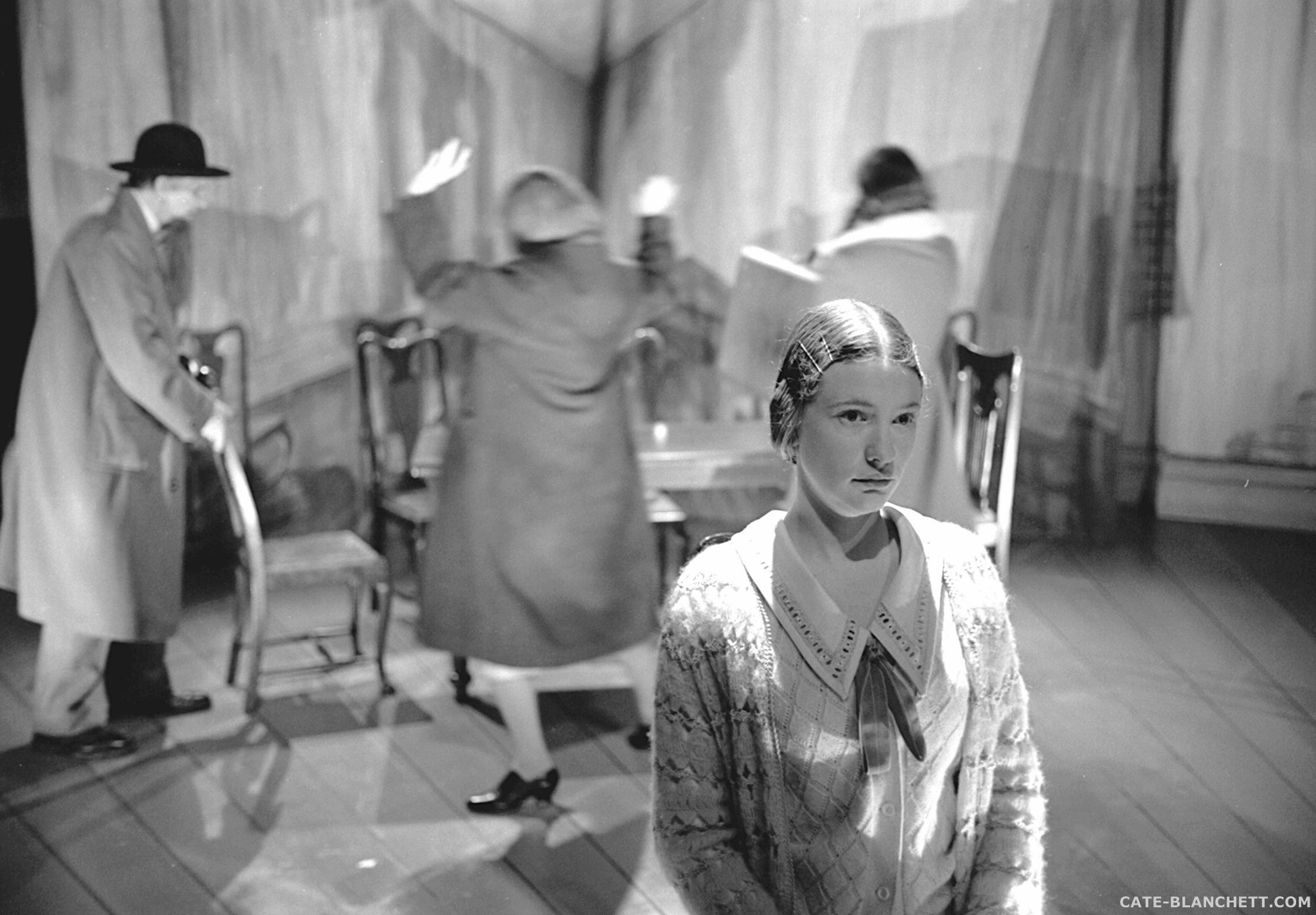 Kafka Dances (1993-1994)
Kafka Dances (1993-1994)
Cate Blanchett as: Felice Bauer
Directed by: Ros Horin
Written by: Timothy Daly
Play run: 7 July – 13 August 1993
Venue: Stables Theatre at Griffin Theatre Company
Inside the mind of Franz Kafka, his boisterous family, his sensible, organised fiancée, a clamorous band of Yiddish performers and his overwhelming desire to write scuffle for dominance.
Cast
Lech Mackiewicz as Franz Kafka
Cate Blanchett as Felice Bauer
Anna Broinowski
Ronald Falk
Jane Harders
Related Images
View more images at the gallery.
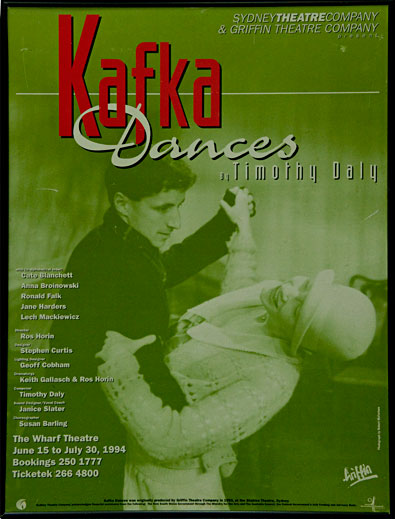
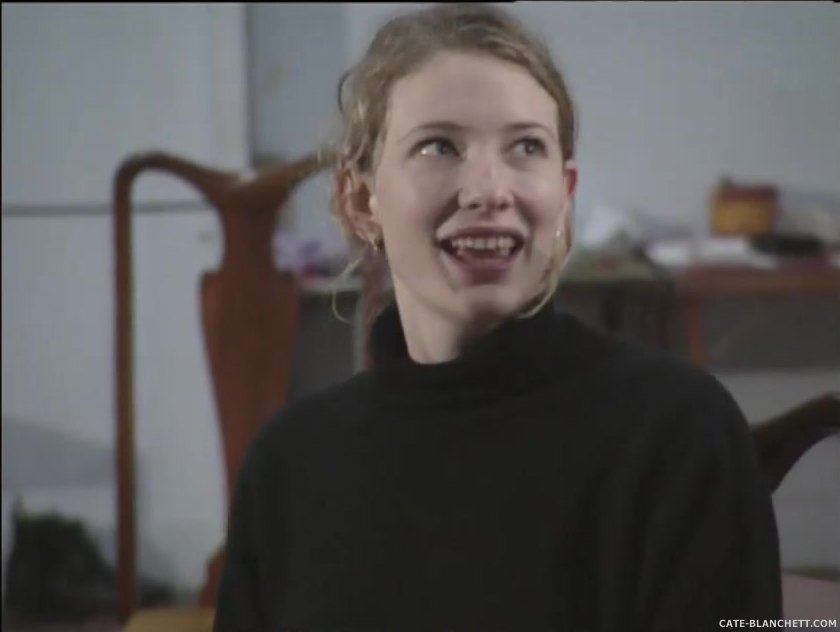
- “…it has been really great to have the opportunity to be involved with plays that have been well written in the first place. In Oleanna and Kafka Dances there has been a very interesting dilemma there in the text.” (Sydney Morning Herald, June 1994)
- “I found Kafka’s [writing] was describing a particularly adolescent male point of view which I found hard to relate to. It’s only been this time around I’ve appreciated his genius. He could never form a relationship because he was raising women to these epic, almost terrifying, extremes. Of course, Felice can never fulfil or achieve these, so it was doomed for her from the beginning.”
- On the restaging of the play at the Sydney Theatre Company: “I have an enormous sense of pride in doing the play again. There is rarely the money to have the play developed and workshopped over six months. What often happens with new Australian work is that it is given one performance and that’s it, goodbye! There has been some rewriting but not extensively. I think we found out more about the relationships and the characters. What is great about the play is that it has withstood a second scrutiny. There is a lot there.
Quotes from Others
- Ros Horin:
— “[She was] very self-effacing, giving off an ‘am I good enough?’ unconfident image. Cate [Blanchett] was very funny, marvellous in the role.”
Selected Review
- The Australian — “It’s a play that comes from Daly’s reading of Kafka’s letters to Felice Bauer, the woman to whom he was engaged twice but never married, to whom he wrote many manic, passionate, intelligent letters, but met only half a dozen times. Thankfully, it’s also a play that leaves the world of bizzare fact hunting behind for one closer to spiritual search: it uses fragments of one artist’s life story to expostulate on a parcel of themes to do with the struggle by any artist to stick with his or her own emerging version of “the truth”.
What’s most pleasing about this production is its modest, yet effective, theatricality. Kafka’s inner world, for example, is presented as a form of Yiddish dream theatre where the family members, in a spirit of amateurish fun, serve as inner voices, challenging the writer to try and overcome some of his more extreme personal defects. With the prospect of marrying a beautiful woman, he does try to work on those skills deemed necessary for a good performance on the that stage called life, but to little avail, and the dream sequences inevitably take on that idiosyncratic form of private terror for which the great Prague-born writer is renowned.
This is a well cast production, with Ron Falk and Jane Harders, as the Jewish parents, pushing their well-honed thespian skills to a Blackadder edge in the dream sequences, and Anna Broinowski’s threateningly dark sister artfully balancing all that is innocent and light in Cate Blanchett’s Felice. A 1992 NIDA graduate, Blanchett has already been recognised as an actor of particular promise, and here she gracefully forges her claim further.
But the night goes, as it should, to Lech Mackiewicz’s Franz Kafka. This gifted graduate from one of Poland’s leading theatre schools shares Kafka’s dark European looks, and the nervous stutter and tubercular cough appear easy; but what’s really special is the credibility with which Mackiewicz maps out the pain and struggle of an artist attempting to overcome personal shortcomings and a hostile environment to make his or her life’s work.
The premise may well be rather old fashioned – artist as misunderstood genius – but in this actor’s hands it’s been honed down to sculpture, originality, a work of art. The lights come on in the ever-so-sensitive face of this Kafka every time a new hope dawns, only to be dashed again in the darkness of broken dreams so poetically recorded in Kafka’s own work.
Finally, credit must also go to Ros Horin who, as the artistic director of the Griffin Theatre, not only saw the potential of this play, but has since worked it up to the level at which it can enjoy mainstream success.”
Trivia & Facts
- A co-production with the Sydney Theatre Company, where Cate Blanchett was the company’s co-artistic director and co-CEO (from 2008 to 2013), with her husband Andrew Upton (tenure from 2008-2015).
- The play had its run at the Sydney Theatre Company from 15 June to 30 July 1994.
- Cate Blanchett won Best Newcomer Award from Sydney Theatre Critics Awards.
- In 1993 she became the first person to win the Sydney Theatre Critic Awards for Best Newcomer (for Kafka Dances) and Best Lead Actress (for Oleanna) in the same year.

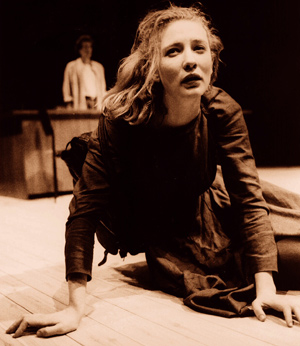 Oleanna (1993)
Oleanna (1993)
Cate Blanchett as: Carol
Directed by: Michael Gow
Translation by: David Mamet
Play run: 8 September – 9 October 1993
Venue: The Wharf at Sydney Theatre Company
The play tells the story of a pompous university professor named John and his student, Carol, who accuses him of sexual harassment.
Cast
Cate Blanchett as Carol
Geoffrey Rush as John
Related Images
View more images at the gallery.


- On her character, Carol: “Mamet has technique he advises to actors and that is to concentrate on the action. What I’m finding is that I can’t actually label her. I can’t say she is this or that type of person. She is a series of actions. A person in crisis. Like John is a person in crisis.
I feel in terms of my responsibility to women as a group of people that it is important that we don’t see our identity as a static thing, that Carol is representative of all women. The most important thing is that women have the right to play anything on stage like men do.” (Sydney Morning Herald, September 1993) - “I thought, I can’t do this play, it’s a misogynist piece of crap. But it angered me so much that I had to do it. I wrestled with it; I was so internal the whole time. Then, when we had the dress rehearsal in front of the theatre staff, when Geofrrey went to hit me at the end, I laughed – I was outside the scene – and Michael Gow, the director, said, ‘If you do that onstage on opening night I will sak you,’ and I just wept and wept. [The Gow gave her the magic key.] He said, ‘Now do it again and don’t take your eyes off Geoffrey. Don’t think about the words you’re going to say, just look at him and listen.’ The little bit of energy I had left was focused out on Geoffrey. The play took off. Because I was no longer thinking about myself. (Vanity Fair, March 1999)
- “I had a profound experience when I left drama school. I saw these graduates who were deeply, deeply talented who didn’t necessarily come out at the right time. In a way, I was lucky. I was cast in a production of Oleanna at the Sydney Theatre Company, opposite Geoffrey Rush, which was seminal for me, which hit the world at that time, making it electric.” (Santa Barbara Independent, January 2008)
Selected Review
- Sydney Morning Herald — “David Mamet’s Oleanna at the Wharf Studio will set your blood racing. It will grip you hard and shake you about until the bones in your body rattle and every fibre of your decency you thought you had crumbles.
Most of its impact comes from Mamet’s extraordinary dramatic writing skills, his understanding of dramatic conflict (which has nothing to do with ideas being in conflict and everything to do with human beings being so) and his hard-nosed ability to find a sore on society’s delicate, protective skin and dig at it until it bleeds.
But it also comes from Michael Gow’s relentless, near-hysterical production of it: from the moment the loud, pompous entr’acte begins, to Cate Blanchett’s last panting, beaten gasp, Oleanna is an unstoppable roller-coaster ride to horror.
Not horror in the Hollywood-movie sense; horror in some other deep, moral sense, the kind that accompanies the realisation that it has all come to this, that we have all come to this.
“This” is something quite specific in Oleanna and it begins with Mamet’s plot: Carol, a student in education, brings a charge of sexual harassment against her professor, who, as a consequence, loses his job, his house and possibly his family. He is virtually destroyed. When he discovers the charge has escalated to one of rape at the urging of Carol’s “Group” (one presumes these are her hardline politically correct feminist friends, although it is never spelt out), he loses control, attacks her violently, punching, kicking her, yelling “Rape you..I wouldn’t touch you with a 10-foot pole, you little cunt.” The play ends with the two looking at each other across an enormous abyss.
The “this” is unsettled a little by the brilliance and passion with which Mamet seems to put both sides of the situation, pulling his audience with him one way and then the other. His arguments about education and a teacher’s responsibility towards his or her pupil are complex and brought beautifully to bear within the fabric of the work itself. More than this, his plays work like a brief, passionate plea for the intellectual freedom – the title, Oleanna, comes from the name of a song dedicated to the creation of Utopia.
But the intellectual freedom and Mamet’s scintillating theatrical games fade into insignificance when one considers the ending. There is something primeval about it, visceral. Nor does it come from nowhere, it is there, building its way up to the play’s surface through the action, until it explodes through into the final moments. And looking down through the fissure, it is possible to glimpse something awful at work in Oleanna, something akin to hatred. It is enough to make your blood curdle.
Is this what we have come to?
If Gow’s production answers the question, then it is in the affirmative. There is an aggressive thrust in its energy and phrasing, its pace is urgent. This is necessary for Mamet’s theatrical tricks to work, and Gow pushes and pulls the pulleys like a master. His final moment of having John move back behind the huge desk, surrounded by books, to stand looking down at the cowering woman makes the heart pound with its power as an image.
But what is more revealing is this production’s attitude to its two characters.
Geoffrey Rush is dynamic as the pompous, patronising, opinionated fop of a teacher, John. But he is also revealed as capable of compassion and care, despite his dreadful self-interest and self concern. He is an individual, a human being with failings, but a human being nevertheless. He is representative of the individual, the member of the status-quo – albeit, and this is significant, too, an elite member of that status quo.
Blanchett as Carol is equally dynamic; she gives a brilliant and sustained, almost frightening, performance. But her brilliance reminds one of a diamond on the edge of a drill; and there is in her rendition of Carol a kind of fanaticism that is mindless, blind, like something inhuman.
And even when Blanchett, good actor that she is, does give her Carol every human quality she can find to give her a human shape, like vulnerability and passion, for example, the writing and direction is against her.
Her role in the play is to be the representative of the Other, the outsider, the Group or collective against the struggling individual; she is the mind-less as opposed to the thoughtful, she is a representative of those who try to change the status quo, who demand space and validity for their agenda – and on ad infinitum, the list is by now very familiar.
In Oleanna the symbol of that subversion is a woman. And in Oleanna, it is male violence alone that beats her into submission.”
Trivia & Facts
- Cate Blanchett and Geoffrey Rush have worked together in film — Elizabeth (1998) and Elizabeth: The Golden Age (2007), they are both in Oscar and Lucinda (1997) but they did not share scenes together.
- Cate Blanchett won Best Lead Actress from Sydney Theatre Critics Awards.
- In 1993 she became the first person to win the Sydney Theatre Critic Awards for Best Newcomer (for Kafka Dances) and Best Lead Actress (for Oleanna) in the same year.
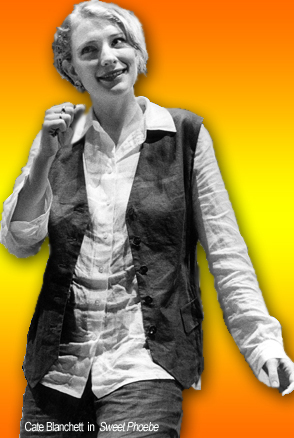 Sweet Phoebe (1994-1995)
Sweet Phoebe (1994-1995)
Cate Blanchett as: Helen
Directed by: Michael Gow
Written by: Michael Gow
Play run: 2 November – 17 December 1994
Venue: The Wharf at Sydney Theatre Company
* The play toured Melbourne and London in 1995
Helen and Frazer offer to look after Phoebe, a troublesome dog, for their best friends who go away on holiday. Only one thing proves more difficult than adjusting their highly-ordered lives – finding her when she runs away. Nothing could have prepared them for the coming week.
Cast
Cate Blanchett as Helen
Colin Moody as Frazer
Related Images
View more images at the gallery.

- “Oleanna and Sweet Phoebe have really been huge turning points for me in terms of approach to work and unlocking big, frightening doors. I thought they were almost too difficult for me.” (Sydney Morning Herald, March 1995)
- “Michael [Gow], as a director, forces me to confront barriers and unlock doors and place myself on the line, and his pursuit of that is relentless, which I admire and warm to, but it’s very difficult.” (The Age, February 1995)
- On the difference of performing the play in Sydney, Melbourne then London: “I’m a great fan of Michael Gow’s writing and I feel that he places himself in the public arena in a very dangerous and provocative way. In Australia people come to Michael Gow’s work with a knowledge of him as a personality and so people are not only receiving the play but are receiving him as a figure. This happened when we performed Sweet Phoebe at the Sydney Theatre Company’s Wharf theatre. Then we went to Melbourne with it and it got a different response because it was a play from Sydney, and I experienced that rivalry. Finally it was such a relief to be performing in a really intimate space in England where the play came with no baggage and I felt that it really found its audience. There were some very suburban references, very specific references to place when Helen’s going out to look for the dog, but the actual humor of it was received better in the UK than in Australia. It was a great ending to the production that it actually found its audience here.” (Playing Australia, 2003)
Trivia & Facts
- The play toured at Merlyn Theatre at the Malthouse in Melbourne in February to March 1995, and Cate Blanchett made her London stage debut at Warehouse Theatre in Croydon in 1995.
Source: AusStage

 A Manual for Cleaning Women (202?)
A Manual for Cleaning Women (202?) Father Mother Brother Sister (2025)
Father Mother Brother Sister (2025)  Black Bag (2025)
Black Bag (2025)  The Seagull (2025)
The Seagull (2025) Bozo Over Roses (2025)
Bozo Over Roses (2025) Disclaimer (2024)
Disclaimer (2024)  Rumours (2024)
Rumours (2024)  Borderlands (2024)
Borderlands (2024)  The New Boy (2023)
The New Boy (2023) 











